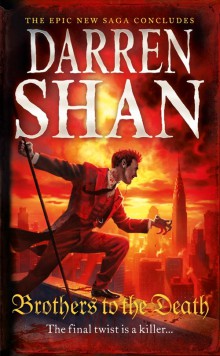I have just seen a tweet by Darren Shan to announce that today marks the 15th anniversary of when he first had the idea for Cirque Du Freak, a book which in my opinion paved the way for just about every writer of children's and YA horror ever since. I feel it is only fitting that I should honour this occasion by posting my review of Brothers To The Death, the final instalment in his Saga of Larten Crepsley, a character we first met in Cirque.
Brothers To The Death is Shan at his very best as a writer, and I challenge any fan of his vampire books not to find this a rewarding and deeply satisfying read. I have a feeling that, come the final words of this book there will be a legion of fans who, like I did, feel a broad grin erupt on their face, at which point they will probably, again like me, reach for their well-read copy of Cirque Du Freak and continue the story. I don't think I am spoiling anything when I say that, due to the way Brothers To The Death ends with everything slotting together perfectly, Cirque Du Freak will from this point on forever feel like the perfect sequel in a way that would have George Lucas going green with envy.
One of the things I like the most about Shan's vampires is that, with a minority of exceptions, they are not evil creatures. They are just different from humans, and by and large prefer not to interfere in the politics and actions of mortal man. This allows for much better character development of the vampires than we usually see in such novels, where the main protagonist is quite often a human, and Darren Shan is not afraid to turn our perception of these supposedly hateful characters on its head. As such, over this series we have seen Larten aid troops during the Great War, and even fall in love with a mortal (without wanting to drain her blood). In this instalment, much of it set during the horrors of WWII, we see even more humanitarian actions from Larten and some of his compatriots, as they help to heal victims of the war, both in Germany and post-atom bomb Japan. We also see Larten make friends with a community of monks. Unlike the majority of religious people in vampire fiction, these holy men do not look on the vampires as evil incarnate, but as just another of God's creations.
As I mentioned, some of this book is set in Europe during the 1930s and 1940s, and as such the Nazis play an important role in the plot. As a result of loose talk, Adolf Hitler has discovered the existence of the vampires, and sends emissaries to meet with members of the clan with a view to forging an alliance. Larten finds himself accompanying one of the vampire princes to one such series of meetings, and finds himself put on the spot and asked for his opinion. The answer he gives will go on to affect his life in a way he could not have dreamed, and leads to an event that sees him spend much of the rest of the book thirsting for revenge, travelling the world in search of the perpetrator.
Fans of the the original books and now The Saga of Larten Crepsley have been asking numerous questions as this prequel series has progressed, and they will be very happy that those questions are all answered in this volume. There has been some speculation in the comments sections of some of my reviews of the books as to the fate of Wester, as he is not mentioned in original series. To those who took the time to comment on this I say you will not be disappointed! Other queries related to Larten's relationship with some of his fellow vampires that we know from the original series are also fleshed out, as is his connection with the Mr Tall and his Cirque, and also how Madam Octa came into his possession.
Much as I loved the original Saga of Darren Shan, and also his Demonata books, I think the four books that now comprise The Saga of Larten Crepsley are now my favourite Darren Shan books. His writing has matured considerably since Cirque Du Freak, especially in the way he develops his main characters. Larten is the ultimate anti-hero, deeply flawed and carrying some rather despicable baggage from his long life, but Shan manages to create an emotional bond in his readers that have them pitying him rather than condemning him. Many young readers will find themselves able to relate to this lonely wanderer, who goes through lengthy periods of low self-esteem, and I think many will be deeply moved by the events that happen in this book.
This books marks the end of an era for Darren Shan, as it is his goodbye to vampires and Harper Collins. In September we will see the release of his new twelve-books series, Zom-B, with Simon and Schuster, and after this brilliant end to The Saga of Larten Crepsley I am looking forward to that more than ever. However, I feel one must never say never where Darren Shan is concerned - it would not surprise me if he decided to return to writing about his vampire world again some time in the future.
